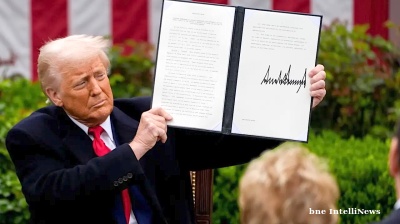The Lithuanian president officially asked former anti-graft police chief Saulius Skvernelis on November 15 to form a new government on the basis of the victory of his Peasant and Green Party (LVZS) in the October elections.
Skvernelis will now start working on the line-up of a coalition government with the Social Democratic Party (LSDP). The social democrats led the previous cabinet but suffered a heavy drop in support in the vote last month. Voters followed the growing trend by turning away from mainstream parties to hand the conservative LVZS a surprise victory. However, policy is thought unlikely to change dramatically.
LVZS will hold the prime minister's seat and 11 others in the new cabinet. The party won 56 of the 141 seats in parliament at the vote. The Social Democrats, which will have 17 MPs, will control three ministries.
President Dalia Grybauskaite said in a statement she expects the government to take on pressing problems in social security, economic growth, transparency of government, and education. She is also keen to maintain a focus on defence, which has become a central issue as Vilnius eyes warily what it calls Russia's renewed imperial ambition.
The president will be happy to see a conservative-led government back at the helm, although Grybauskaite has her differences with the left-leaning LSDP. Still, she will also be keen to see the new coalition maintain the country’s overall economic and political direction, although some uncertainty does exist.
“It is not clear whether LVZS's attempts to broaden its support beyond its traditional agrarian base have created potential internal disagreements over precise policy direction,” Fitch Ratings wrote in a report released the same day. However, the presence of the LSDP in the government “should support policy continuity, and reinforces our pre-election view that structural reform would continue,” the agency sums up.
The key near-term initiative for the new Lithuanian government is the New Social Model covering labour law and social insurance, which is due to take effect from January. It aims to improve labour market flexibility, reduce poverty, and make the pension system more financially sustainability in the long term.
However, while economic and social policy looks set to push to the left, security policy priorities - membership in the EU and Nato - will remain unchanged. Those bodies are seen as the Lithuania’s greatest defence as geopolitical tension with Russia persists. The new government will undoubtedly join its peers in Estonia and Latvia in warily eyeing the US approach to Nato under Donald Trump’s presidency.
News

Slovak PM Fico delays approval of EU’s sanctions package again, blaming Slovak opposition
Slovak populist Prime Minister Robert Fico has again delayed approval of the latest 18th round of EU sanctions against Russia, blaming his latest blocking on the opposition parties in Slovakia.
_1752601672.jpg)
Russia’s consumer spending motor runs out of fuel
A number of indicators point to the stagnation of consumer spending in Russia, which for years has been the main driver of economic growth.

China and Serbia to hold first joint military training exercise
China and Serbia will conduct their first-ever joint military training exercise later this month in northern China’s Hebei Province.

Baltic States face surge in fatal overdoses as nitazenes flood region
A powerful and little-known synthetic opioid called nitazene is fuelling a deadly drug crisis across the three Baltic States, with Estonia reporting a threefold rise in overdose deaths in recent years.



